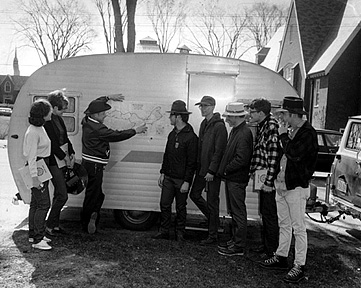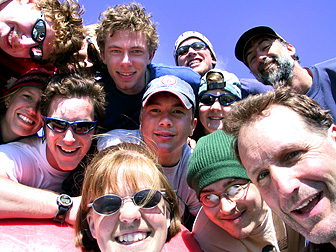May 1966: The first Short Term
Around the time the Beatles sang “Eight Days a Week,” Bates was pondering ways to squeeze even more work from students and faculty. One idea, debuting in 1965-66, was a three-year graduation option. Accelerated students could take extra courses during the fall and winter semesters then attend a special May-June semester each year. The College called it the “4/3 option”; the Mirror had a better name: “an academic endurance race.”

Business and busy-ness were goals of the plan. Keeping faculty and facilities at work longer would increase institutional efficiency. For the student, the three-year option would trim a year of tuition payments, and, for those going on to graduate school, eliminate a rung of the ever-lengthening educational ladder. In a nod to Bates’ work ethic, the catalog also noted that a long summer vacation could be a “considerable waste of time” for some students.
But the law of unintended consequences ended up ruling the day. The three-year option retreated from prominence by the late ’60s, while Short Term quickly became a freewheeling intellectual, social, and recreational jamboree under new Bates president Hedley Reynolds.
By 1969 Short Term was a permanent part of the academic program for all students, having already found its way into campus culture, as noted in a series of Short Term memories offered by the 1968 Mirror editors:
“Sunbathing behind Page…spring Popham…post-spring sports depression…a peculiarly unbalanced sex ratio…Camp Batesie T-shirts…small, friendly barbecues…trips to Reid State Park…after-supper volleyball…Ford Foundation seminars….studying in the Den…socializing in the libe…bio trips to Puerto Rico…weekends in Boston…bermudas in June…religion seminars in NYC…graduation in the Chapel.”
And it was desperately needed. As early as 1967, Professor of Physics Robert Kingsbury saw the benefit of a slower-paced semester. “Students could go off chasing ideas,” he told The Bates Student in an article titled “Students require ‘leisure to learn.'” The hurried and jam-packed academic program of the mid-1960s was not serving students, he added. “Students find themselves without the time to contemplate the ideas presented to them in various courses, or to follow up leads that suggest themselves.”

In fall 1966, The Bates Student asked a few three-year students to review the initial Short Term:
The initial shock of an empty Quad, of the same classes five days a week, and of a roaring crowd in the Den at 9:30 was frightening. Those first few days in May I was convinced that the next two months would be at best painful. By the end of June I knew that the Short Term had been very enjoyable and worthwhile. I especially liked having just a few courses five days in a row. There was no break in the continuity of the material, and with only two or three subjects it was easy to stay organized and keep up with the work. The whole atmosphere was enjoyable and relaxed. Social life got off to a slow start, mainly because we tried to continue the usual Batesie activities. The few of us learned, along with leader Larry Brown, that cookouts, folk sings, trips to lakes, organized dances in the Den and coed everything, from tennis tournaments to pool to volleyball free-for-alls after our coed suppers, were a lot of fun. We had to improvise our social life, and that made it better. Camp Bates is not Bates College. It has a totally difference organization, social life and atmosphere. But it’s great. — Nancy Grose ’69
Taken by itself (with no intended inferences one way or another for the 4/3 totally), the 1966 Short Session was delightful so far as I personally was concerned. After all, being through for the day at 9 a.m., no Saturday classes, Martindale’s fairways in fine shape and lakes full of smallmouth bass, how could I miss? The quality of the students, at least student performance, was clearly above par, the atmosphere relaxed, and there was a moratorium on committee meetings and a minimum of other peripheral distractions for both faculty and students. — George Fetter, professor of sociology
Short Term was an excellent time for practice and dedication to sport. With no worries about assignments, classes or hour exams one could practice as much as three times a day getting into the best shape possible. Despite all this the season was still hurt by the loss of those who could not stay because the extra time provided better chances for better jobs and more money. — Paul Williams ’69
I discovered the unique experience of enjoying my studies in a relaxed, summer atmosphere. The small, close-knit student body and faculty seemed to relish a new type of non-grind semester. Everyone appeared to be able to cope with their work. My marks even improved. — James Levine ’69
I liked the concentration of classes, the “long” two-day weekend, the opportunity to graduate in three years, but there were very few courses offered, virtually none at advanced levels, and there was much free time which perhaps could have been constructively utilized had there been more students, particularly upperclassmen, on campus. — Sid Gottlieb ’69
An answer to the question “What did you think of short term?” It was a delicious dessert with leisure to enjoy the delights of each bite after a two-course meal which had to be consumed so rapidly that it was neither enjoyed nor digested. We have an old-fashioned rule in our house that we cannot have dessert without first properly eating the main course. — Arthur Brown, assistant professor of religion
– H. Jay Burns, Office of Communications and Media Relations